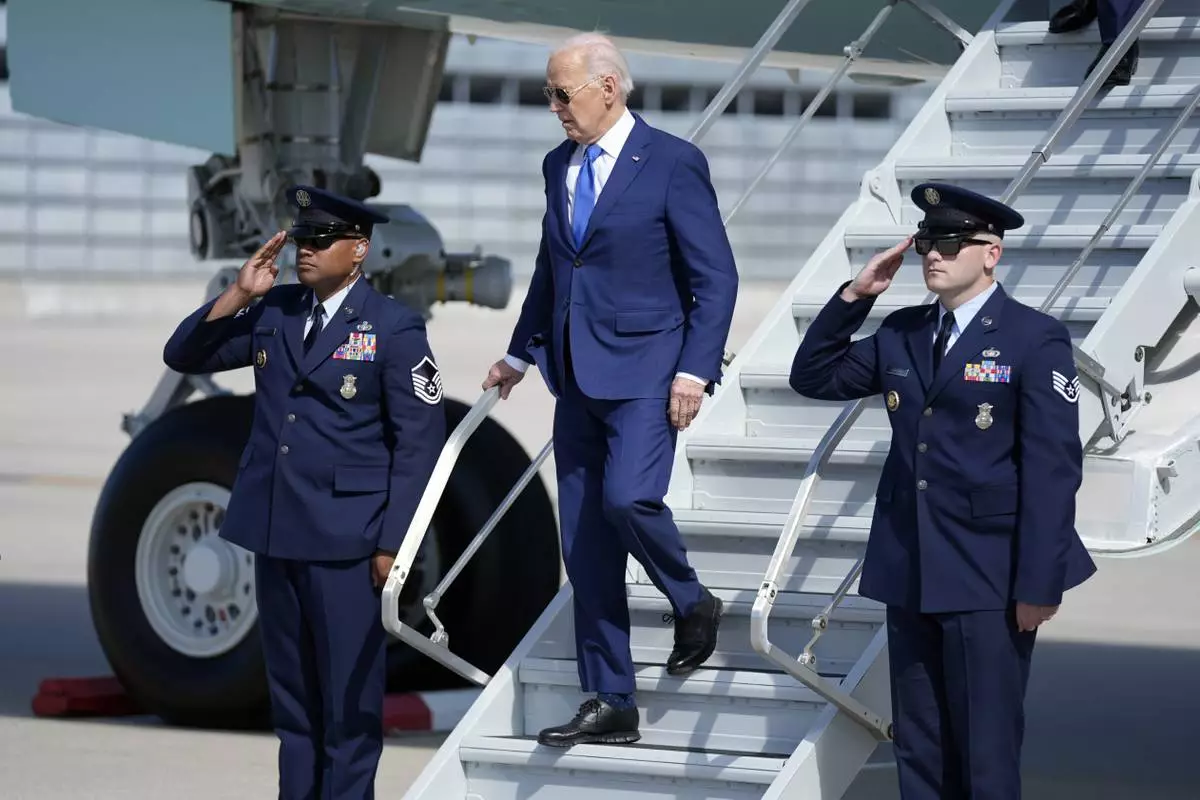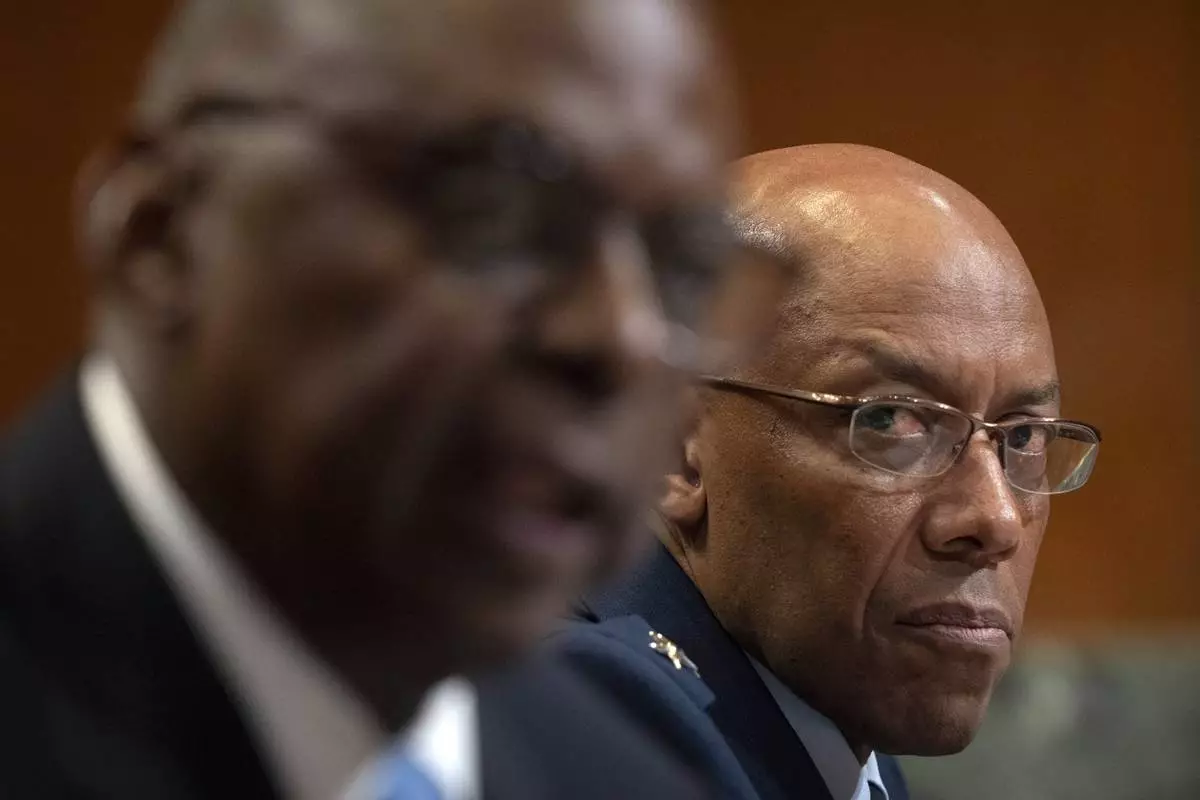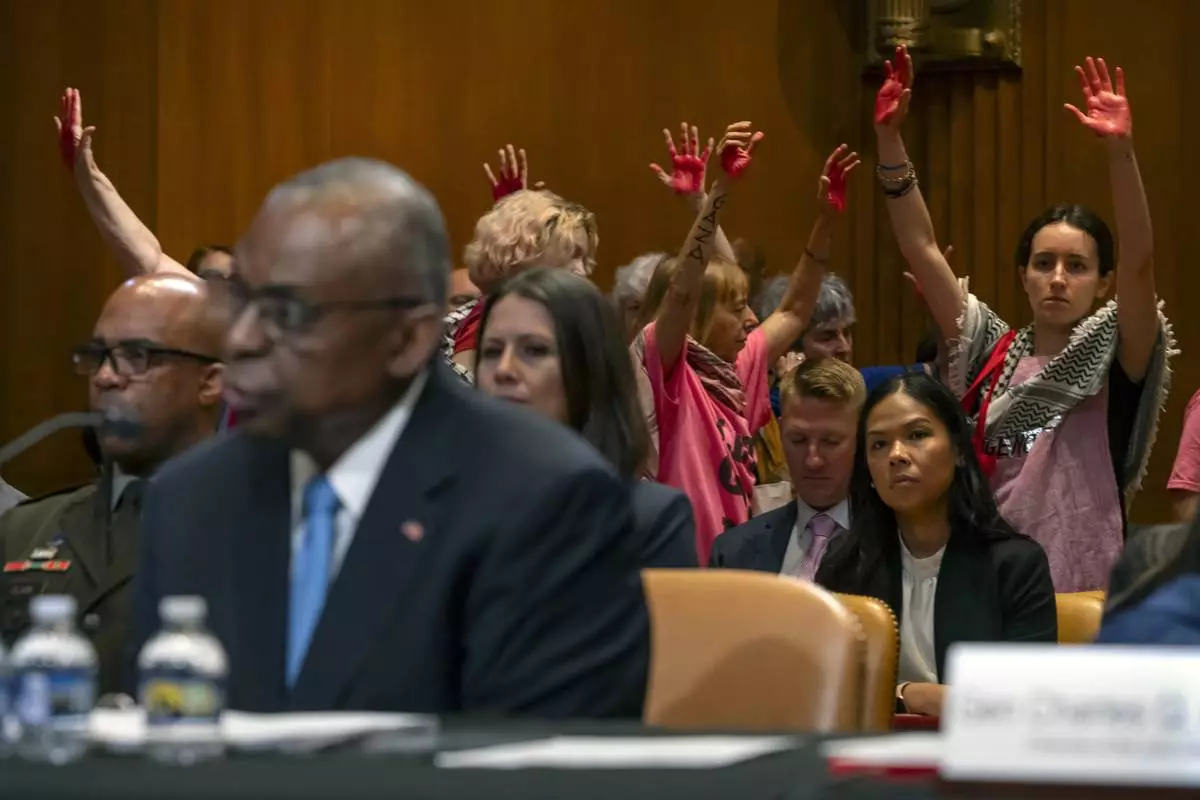A Georgia man scheduled to be executed next week has made the unusual decision not to file a clemency petition seeking to reduce his sentence and spare his life, his lawyers said Wednesday.
Ray Jefferson Cromartie, 52, is scheduled to be put to death Oct. 30 at the state prison in Jackson. He was convicted of malice murder and sentenced to die for the April 1994 slaying of 50-year-old convenience store clerk Richard Slysz in Thomasville, just north of the Florida line. Cromartie also was convicted of shooting and gravely injuring another convenience store clerk a few days earlier.
The State Board of Pardons and Paroles is the only authority in Georgia that can commute a death sentence. The board can reduce the sentence to life or life without the possibility of parole, according to its website. It typically holds a meeting the day before a scheduled execution to consider a clemency petition from a condemned inmate.
"Filing a clemency petition would have required Mr. Cromartie to ask for a sentence of life in prison without the possibility of parole, but there is simply too much doubt in his case to ask for this sentence in good faith," Cromartie attorney Shawn Nolan wrote in an emailed statement.
Cromartie insists he didn't shoot either clerk, and his lawyers have pushed for DNA testing of evidence to prove that. The state argues none of the DNA evidence he seeks would prove his innocence.
A judge last month declined Cromartie's requests for DNA testing and a new trial. Cromartie's lawyers have asked the Georgia Supreme Court to allow them to appeal and to stop his execution from happening while that's pending.
Cromartie's lawyers have also released two letters from Slysz's daughter, Elizabeth Legette.
In a June letter to state lawyers expressing support for DNA testing, she wrote: "My father's death was senseless. Executing another man would also be senseless, especially if he may not have shot my father."
In a letter to the state Supreme Court dated Oct. 16, the day the execution date was announced, Legette said the state's lawyers never responded and wrote, "Today I learned that the State has set a date to execute Mr. Cromartie without doing any testing. This is wrong, and I hope that you will take action to make sure that the testing happens."
Cromartie borrowed a handgun from his cousin on April 7, 1994, entered the Madison Street Deli that night and shot clerk Dan Wilson in the face, a Georgia Supreme Court summary of the case says.
Wilson suffered a severed carotid artery but survived. He couldn't describe the person who shot him, and footage from a surveillance camera wasn't clear enough to conclusively identify Cromartie.
A few days later on April 10, 1994, Cromartie and Corey Clark asked Thaddeus Lucas to drive them to a different store to steal beer, the summary says. Lucas parked nearby and the other two entered the Junior Food Store.
Cromartie shot Slysz twice in the head, the summary says. Unable to open the cash register, Cromartie and Clark fled after Cromartie grabbed two 12-packs of beer.
In both cases, Cromartie told others he had shot the clerks, the summary says.
Lucas and Clark both testified against him at his trial in September 1997. A jury found Cromartie guilty of malice murder, armed robbery, aggravated battery, aggravated assault and gun charges, and sentenced him to die.
Lucas and Clark pleaded guilty to lesser charges, served prison time and were released.
Cromartie's lawyers have asked for DNA testing on evidence, including: shell casings from both shootings; a knit cap and hooded sweatshirt found near the first shooting; a package of cigarettes found near Slysz's body; clothing samples from other possible shooters and Slysz.
But it's not likely the DNA results would lead to an acquittal or different verdict given the other evidence in the case, Southern Judicial Circuit Senior Judge Frank Horkan wrote in denying the request for DNA tests and a new trial. He also found that Cromartie failed to establish that his request for testing wasn't just meant to delay his execution, since he didn't request it "until all other avenues were closed."
Physical evidence shows Cromartie was at the Junior Food Store, but no physical evidence proves he shot Slysz or ever touched the gun, according to Cromartie's lawyers.
"Only by testing the DNA can Georgia ensure Mr. Cromartie's jury was correct to impose death because he was the shooter," Nolan said in the emailed statement. "Georgia officials must agree to DNA testing in this case before it's too late; otherwise, the state risks an unjust execution."
Cromartie would be the third prisoner executed in Georgia this year. The state says it uses an injection of the sedative pentobarbital to put inmates to death.
WASHINGTON (AP) — President Joe Biden said Wednesday that he would not supply offensive weapons that Israel could use to launch an all-out assault on Rafah — the last major Hamas stronghold in Gaza — over concern for the well-being of the more than 1 million civilians sheltering there.
Biden, in an interview with CNN, said the U.S. was still committed to Israel's defense and would supply Iron Dome rocket interceptors and other defensive arms, but that if Israel goes into Rafah, “we’re not going to supply the weapons and artillery shells used, that have been used.”
The interview marked Biden's toughest public comments yet about the potential Israeli military operation and followed his decision to pause a shipment of heavy bombs to Israel last week over concerns that the U.S. ally was moving closer to an attack on Rafah despite public and private warnings from his administration.
THIS IS A BREAKING NEWS UPDATE. AP’s earlier story follows below.
WASHINGTON (AP) — The Biden administration paused a shipment of bombs to Israel last week over concerns that the country was approaching a decision on launching a full-scale assault on the southern Gaza city of Rafah against the wishes of the United States, Defense Secretary Lloyd Austin said Wednesday.
The shipment was supposed to consist of 1,800 2,000-pound (900-kilogram) bombs and 1,700 500-pound (225-kilogram) bombs, according to the official who spoke on the condition of anonymity to discuss the sensitive matter. The focus of U.S. concern was the larger explosives and how they could be used in a dense urban setting like Rafah where more than 1 million civilians are sheltering after evacuating other parts of Gaza amid Israel’s war on Hamas, which came after the militant group’s deadly attack on Israel on Oct. 7.
Austin confirmed the weapons delay, telling the Senate Appropriations subcommittee on defense that the U.S. paused “one shipment of high payload munitions.”
“We’re going to continue to do what’s necessary to ensure that Israel has the means to defend itself,” Austin said. “But that said, we are currently reviewing some near-term security assistance shipments in the context of unfolding events in Rafah.”
The U.S. has historically provided enormous amounts of military aid to Israel. That has only accelerated in the aftermath of Hamas’ Oct. 7 attack that killed some 1,200 in Israel and led to about 250 being taken captive by militants. The pausing of the aid shipment is the most striking manifestation of the growing daylight between Israel Prime Minister Benjamin Netanyahu’s government and the administration of Democratic President Joe Biden, which has called on Israel to do far more to protect the lives of innocent civilians in Gaza.
It also comes as the Biden administration is due to deliver a first-of-its-kind formal verdict this week on whether the airstrikes on Gaza and restrictions on delivery of aid have violated international and U.S. laws designed to spare civilians from the worst horrors of war. A decision against Israel would further add to pressure on Biden to curb the flow of weapons and money to Israel’s military.
Biden signed off on the pause in an order conveyed last week to the Pentagon, according to U.S. officials who were not authorized to comment on the matter. The White House National Security Council sought to keep the decision out of the public eye for several days until it had a better understanding of the scope of Israel’s intensified military operations in Rafah and until Biden could deliver a long-planned speech on Tuesday to mark Holocaust Remembrance Day.
Biden’s administration in April began reviewing future transfers of military assistance as Netanyahu’s government appeared to move closer toward an invasion of Rafah, despite months of opposition from the White House. The official said the decision to pause the shipment was made last week and no final decision had been made yet on whether to proceed with the shipment at a later date.
U.S. officials had declined for days to comment on the halted transfer, word of which came as Biden on Tuesday described U.S. support for Israel as “ironclad, even when we disagree.”
Press secretary Karine Jean-Pierre declined to square the arms holdup with Biden’s rhetoric in support of Israel, saying only, “Two things could be true.”
Israel’s ambassador to the United Nations, Gilad Erdan, in an interview with Israeli Channel 12 TV news, said the decision to pause the shipment was “a very disappointing decision, even frustrating." He suggested the move stemmed from political pressure on Biden from Congress, the U.S. campus protests and the upcoming election.
The decision also drew a sharp rebuke from House Speaker Mike Johnson and Senate Republican Leader Mitch McConnell, who said they only learned about the military aid holdup from press reports, despite assurances from the Biden administration that no such pauses were in the works. The Republicans called on Biden in a letter to swiftly end the blockage, saying it “risks emboldening Israel's enemies,” and to brief lawmakers on the nature of the policy reviews.
Biden has faced pressure from some on the left — and condemnation from the critics on the right who say Biden has moderated his support for an essential Mideast ally.
“If we stop weapons necessary to destroy the enemies of the state of Israel at a time of great peril, we will pay a price,” said Sen. Lindsey Graham, R-S.C., his voice rising in anger during an exchange with Austin. “This is obscene. It is absurd. Give Israel what they need to fight the war they can’t afford to lose.”
Independent Sen. Bernie Sanders of Vermont, a Biden ally, said in a statement the pause on big bombs must be a “first step.”
“Our leverage is clear,” Sanders said. “Over the years, the United States has provided tens of billions of dollars in military aid to Israel. We can no longer be complicit in Netanyahu’s horrific war against the Palestinian people.”
Austin, meanwhile, told lawmakers that "it’s about having the right kinds of weapons for the task at hand.”
"A small diameter bomb, which is a precision weapon, that’s very useful in a dense, built-up environment,” he said, “but maybe not so much a 2,000-pound bomb that could create a lot of collateral damage.” He said the U.S. wants to see Israel do “more precise” operations.
Israeli troops on Tuesday seized control of Gaza’s vital Rafah border crossing in what the White House described as a limited operation that stopped short of the full-on Israeli invasion of the city that Biden has repeatedly warned against on humanitarian grounds, most recently in a Monday call with Netanyahu.
Israel has ordered the evacuation of 100,000 Palestinians from the city. Israeli forces have also carried out what it describes as “targeted strikes” on the eastern part of Rafah and captured the Rafah crossing, a critical conduit for the flow of humanitarian aid along the Gaza-Egypt border.
Privately, concern has mounted inside the White House about what’s unfolding in Rafah, but publicly administration officials have stressed that they did not think the operations had defied Biden’s warnings against a widescale operation in the city.
The State Department is separately considering whether to approve the continued transfer of Joint Direct Attack Munition kits, which place precision guidance systems onto bombs, to Israel, but the review didn’t pertain to imminent shipments.
The U.S. dropped the 2,000-pound bomb sparingly in its long war against the Islamic State militant group. Israel, by contrast, has used the bomb frequently in the seven-month Gaza war. Experts say the use of the weapon, in part, has helped drive the enormous Palestinian casualty count that the Hamas-run health ministry puts at more than 34,000 dead, though it doesn’t distinguish between militants and civilians.
The U.S.-Israel relationship has been close through both Democratic and Republican administrations. But there have been other moments of deep tension since Israel's founding in which U.S. leaders have threatened to hold up aid in attempt to sway Israeli leadership.
President Dwight Eisenhower pressured Israel with the threat of sanctions into withdrawing from the Sinai in 1957 in the midst of the Suez Crisis. Ronald Reagan delayed the delivery of F16 fighter jets to Israel at a time of escalating violence in the Middle East. President George H.W. Bush held up $10 billion in loan guarantees to force the cessation of Israeli settlement activity in the occupied territories.
__
Associated Press writers Josef Federman in Jerusalem and Lolita C. Baldor and Matthew Lee contributed to this report.

President Joe Biden arrives at Chicago O'Hare International Airport to attend a political fundraiser, Wednesday, May 8, 2024, in Chicago. (AP Photo/Evan Vucci)

Chairman of the Joint Chiefs of Staff Air Force Gen. CQ Brown, right, listens as Secretary of Defense Lloyd Austin, left, speaks during a hearing of the Senate Appropriations Committee Subcommittee on Defense on Capitol Hill, Wednesday, May 8, 2024, in Washington. (AP Photo/Mark Schiefelbein)

Protestors opposed to the war between Israel and Hamas stand before a hearing of the Senate Appropriations Committee Subcommittee on Defense with Secretary of Defense Lloyd Austin and Chairman of the Joint Chiefs of Staff Air Force Gen. CQ Brown on Capitol Hill, Wednesday, May 8, 2024, in Washington. (AP Photo/Mark Schiefelbein)

Sen. Lindsey Graham, R-S.C., speaks during a hearing of the Senate Appropriations Committee Subcommittee on Defense with Secretary of Defense Lloyd Austin and Chairman of the Joint Chiefs of Staff Air Force Gen. CQ Brown on Capitol Hill, Wednesday, May 8, 2024, in Washington. (AP Photo/Mark Schiefelbein)

Protestors opposed to the Israel-Hamas war are escorted out as Secretary of Defense Lloyd Austin, left, speaks during a hearing of the Senate Appropriations Committee Subcommittee on Defense on Capitol Hill, Wednesday, May 8, 2024, in Washington. (AP Photo/Mark Schiefelbein)

Secretary of Defense Lloyd Austin attends a hearing of the Senate Appropriations Committee Subcommittee on Defense on Capitol Hill, Wednesday, May 8, 2024, in Washington. (AP Photo/Mark Schiefelbein)

White House press secretary Karine Jean-Pierre speaks during a briefing at the White House, Tuesday, May 7, 2024, in Washington. (AP Photo/Evan Vucci)

President Joe Biden speaks at the U.S. Holocaust Memorial Museum's Annual Days of Remembrance ceremony at the U.S. Capitol, Tuesday, May 7, 2024 in Washington. (AP Photo/Evan Vucci)

Pentagon chief confirms US has paused bomb shipment to Israel to signal concerns over Rafah invasion

Pentagon chief confirms US has paused bomb shipment to Israel to signal concerns over Rafah invasion

Smoke rises following an Israeli airstrike east of Rafah, Gaza Strip, Monday, May 6, 2024. (AP Photo/Ismael Abu Dayyah)




















